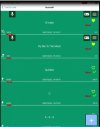First time I try the B4XFormatter. I need to format numbers like this:
5 -> 0.005
120 -> 0.120
1250 -> 1.250
MinimumIntegers is working but the effect of GroupingCharacter I cannot see
Is it also possible to format numbers in groups of 4 integers like 12345678 -> 1234 5678?
5 -> 0.005
120 -> 0.120
1250 -> 1.250
MinimumIntegers is working but the effect of GroupingCharacter I cannot see
B4X:
Dim formatter As B4XFormatter : formatter.Initialize
formatter.GetDefaultFormat.GroupingCharacter = "."
formatter.GetDefaultFormat.MinimumIntegers = 4
Log(formatter.Format(number))Is it also possible to format numbers in groups of 4 integers like 12345678 -> 1234 5678?

